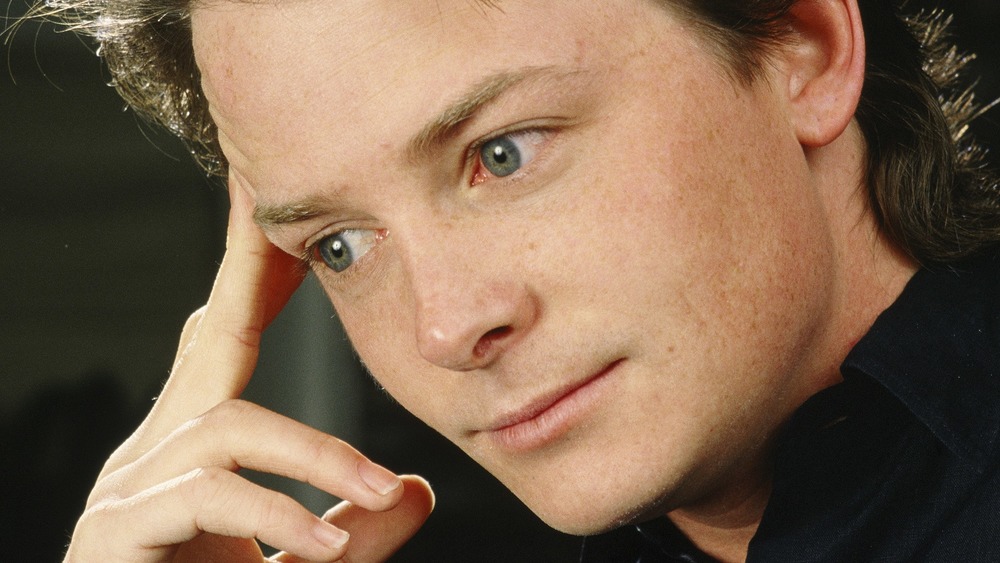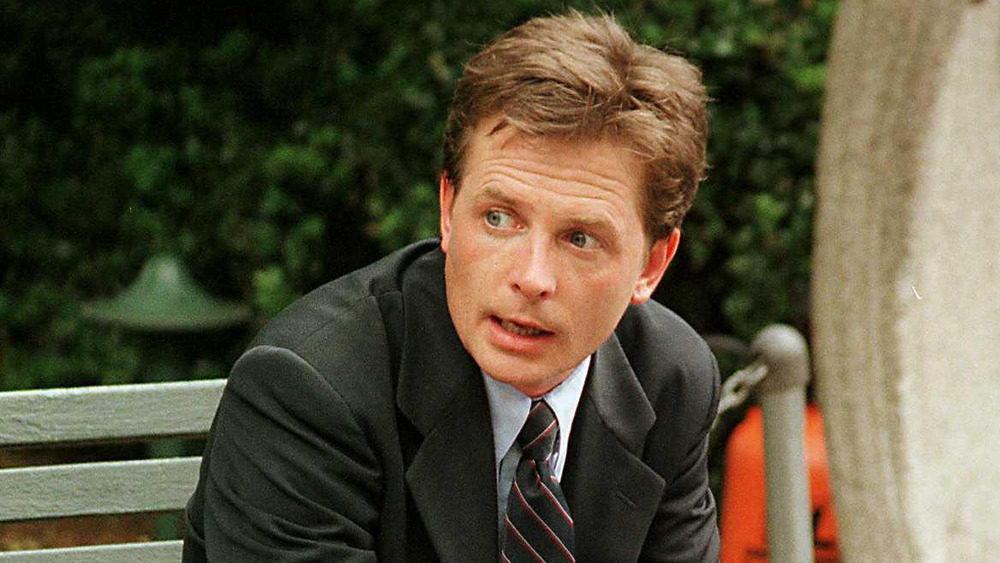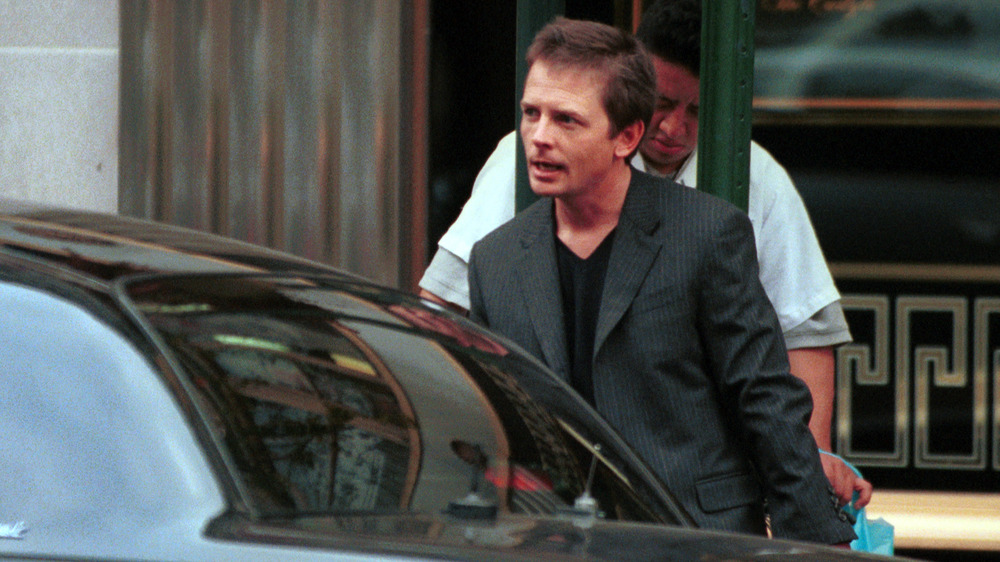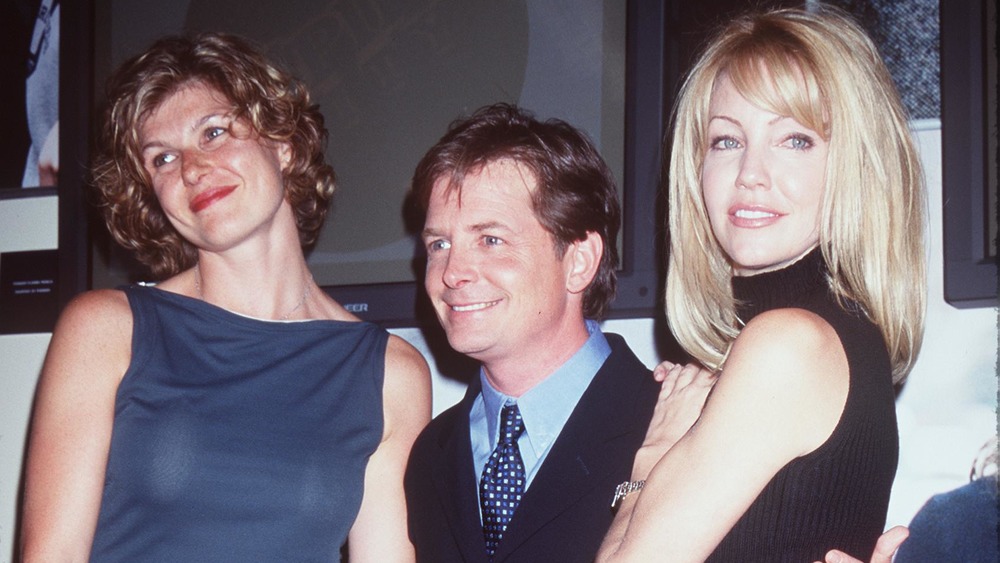Tragic Details About Michael J. Fox
Hollywood stars often believe their own hype. Every now and then, though, a kind, genuine soul whose light shines brightly wades through the sea of soaring egos in the entertainment industry. Michael J. Fox is one such celebrity who is loved by fans and peers alike and extremely well-connected in Hollywood — so much so that Watch What Happens Live made a segment out of it. When Andy Cohen presented Fox with a roster of A-list celebrities and asked for anecdotes on a November 2020 episode of the talk show, Fox not only revealed that he'd interacted with most of the public figures mentioned, but met multiple U.S. presidents.
Fox's most notable early roles were iconic characters in pop-culture history: Reagan-loving teen Alex P. Keaton on NBC's Family Ties and time-traveler Marty McFly in the Back to the Future film trilogy. Fox also played Ben Stone in Doc Hollywood, Mike Flaherty in ABC's Spin City, and a host of other starring and guest-starring roles since he first appeared on screen in 1978.
The beloved star deftly navigates fame while facing grave personal challenges that have threatened his career. He credits his struggles with making him the man he is today. We always hate to see good people go through difficult times, as is the case with Fox. Let's take a look at his life and career to gain a deeper understanding of the troubles he has faced and how he manages to maintain his famous optimism through it all.
Two big breaks almost didn't happen for Michael J. Fox
Can you imagine Family Ties without Michael J. Fox? Back to the Future? Well, he almost got iced out of both pivotal roles. Family Ties producer Gary David Goldberg did not like Fox's audition and offered Matthew Broderick the role of Alex P. Keaton, but, as Goldberg told The Interviews, Broderick would not move to Los Angeles. Thankfully, casting director Judith Weiner persuaded Goldberg to bring Fox back for another audition.
Fox was not initially cast in Back to the Future because he was needed on Family Ties during Meredith Baxter's maternity leave, producer Bob Gale told People. Filming started with Eric Stoltz in the role of Marty McFly, according to We Don't Need Roads: The Making of the Back to the Future Trilogy, but the director wasn't happy with Stoltz's portrayal and brought in Fox to replace him.
With the success of these roles, Fox almost got caught in the rat race. He told The New York Times Magazine he wanted to be "a rock star. That's what I thought being famous was ... I was kind of an idiot." He later explained, "I'd be riding in a limo with my head out the sunroof and a beer in each hand, thinking, 'Who expected this success from me?'" The actor saw his fame as a matter of luck. "I was comfortable with the idea that I had won the lottery, and that made me less respectful of what talent I had," he said.
Michael J. Fox got life-changing news early in his career
Fate stepped in to separate Michael J. Fox from the trappings of fame when he was diagnosed with Parkinson's disease, a neurodegenerative disorder leading to loss of motor skills, in 1991—just as he was being solidified as a box-office superstar. He did not publicly reveal the diagnosis until he opened up about it to People in 1998. In hindsight, he views Parkinson's as a blessing because it "got his head in the game." Being diagnosed with the disease in the prime of his life changed his outlook on everything, and as the Canadian-born actor told The New York Times Magazine, it made him realize "there are bigger things than being a rock star." As AARP noted, he was told by doctors he had "ten good working years left" upon his diagnosis.
Interestingly, The Guardian reported that at least three other members of the Leo and Me cast and crew, a Canadian TV series Fox starred in when he was 15, developed Parkinson's. With so much still unknown about the disease and its causes, sometimes clusters of cases like this can create more questions than answers. While the exact cause of Parkinson's has yet to be determined, the Michael J. Fox Foundation's website says, "research points to a combination of genetic and environmental factors."
Following his diagnosis, Michael J. Fox began drinking a lot
As University of Florida Center for Movement Disorders and Neurorestorations' Dr. Michael S. Okun told People in 2014, depression in Parkinson's patients is common due to "degeneration in brain circuitry, dopamine, serotonin and epinephrin ... chemicals that help keep the balance from depression." Michael J. Fox is no exception. He says he went through a deep depression following his diagnosis, which drove him to drinking heavily. The actor recalled to Howard Stern (via People), "I used to drink to party, but now I was drinking alone and ... every day."
Fox told The New York Times Magazine he made some ill-thought-out personal and professional decisions in the wake of his diagnosis but that he finally came to accept and understand the reality of it in 1994, saying, "That's when I started to accept the disease — and acceptance doesn't mean resignation. It means understanding and dealing straightforwardly."
There was also a force for good in his life steering him in the right direction: his on-screen girlfriend from Family Ties, Tracy Pollan, who was by now his wife. Fox reveals in his 2020 memoir, No Time Like the Future, that their oldest son, Sam, says "his earliest memories include going to the fridge to get [Fox] beers." Pollan looked at Fox in his messy state and said, "Is this what you want?" That view from the outside is what it took for him to stop drinking and look forward toward the future.
Michael J. Fox has undergone significant operations
Parkinson's is serious business, and Michael J. Fox has been willing to try whatever might work to reduce his symptoms. He had brain surgery in March 1998, the year he revealed his diagnosis to the world. It was a thalamotomy to reduce tremors, and the surgery was performed while he was awake and interacting with the doctor. The actor told People, "They did something once that slurred my speech, and I thought, 'Oh, man, you're messing with my brain. It's freaking me out.'" But the procedure was thankfully successful in reducing Fox's tremors, thanks to neurosurgeon Bruce Cook.
More recently, Fox had spinal surgery to remove a (benign) spinal cord tumor, unrelated to Parkinson's, that was interfering with his ability to feel and move his legs. He began falling and couldn't discern what was caused by Parkinson's and what was due to the tumor, so he had surgery in 2018 to remove the tumor. As he explained to People, "I was heading for paralysis if I didn't get it operated on."
The Golden Globe-winning actor shared with The New York Times Magazine that he hallucinated while coming out of anesthesia, exclaiming, "I thought the coat slumped on the floor against a chair was a gorilla." But it was challenges in the months to come, during the long road to rehabilitation and recovery, that almost broke his ever-hopeful spirit.
Michael J. Fox had to learn how to walk all over again
After his April 2018 spinal surgery, Michael J. Fox followed a tough path toward healing. Unable to walk, with medical aides alongside him 24 hours a day, he started to lose the optimism for which he is famous. Even now, more than two years later and after intense physical therapy, he doesn't have the movement he did before his spinal tumor appeared. Fox told The New York Times Magazine, "I envy 90-year-old men with canes who can move briskly. I'll think, That son of a b***h can move!"
In November 2020, he revealed to People that writing has become his main outlet, and he's fine with that because he likes doing it. "Optimism is sustainable when you keep coming back to gratitude, and what follows from that is acceptance," Fox told Today.
And the rest is future. Or history. Or...okay, Doc, what year did you enter in the DeLorean, again?
After his spinal surgery, Michael J. Fox sustained an injury
Try as he may to stay positive, even Michael J. Fox falters occasionally. He told The New York Times Magazine his health issues in 2018 made him wonder, "Was it false hope I'd been selling? Is there a line beyond which there is no consolation?" What took him to such a dark place? A fall.
While getting breakfast in his kitchen while still recovering from his spinal surgery, Fox fell and fractured his arm, requiring 19 pins and a plate to heal. What's worse is that it was his first morning alone since the surgery. He had returned early from vacation with his family to appear in a Spike Lee film, and Fox thought he was healed enough to be on his own. Unfortunately, he was mistaken. Describing the scene after the fall, he told The Morning, "I had to get the phone and make it — and that was all complicated — and made a call and got an ambulance on its way. And I sat under the phone on the floor waiting for the ambulance."
According to USA Today, when speaking with Denis Leary at the Tribeca Film Festival in 2018, Fox admitted his outlook became bleak. "I was the guy who made lemonade out of lemons but I was out of the (expletive) lemonade business," he said. "I couldn't do that."
Michael J. Fox's enduring battle with Parkinson's
When The New York Times calls you "the most credible voice on Parkinson's research in the world," you know you're doing something right. Indeed, Michael J. Fox is determined to help others avoid the suffering he has endured, and he remains hopeful that a cure for Parkinson's will be discovered.
An avid proponent of stem-cell research, he doesn't mind getting political when necessary in the name of medical research. He testified before Congress to help secure funding for research of the disease, and he has gone so far as to endorse candidates who strongly support stem-cell research. He even appeared in a campaign spot for Claire McCaskill. As The Washington Post noted, Fox's body movements in the commercial caused many right-leaning pundits like Rush Limbaugh to accuse Fox of faking his symptoms. Fox told ABC News that he anticipated the ad would get a response, but didn't expect that take.
His commitment to Parkinson's research is inspiring, and he started an organization, The Michael J. Fox Foundation for Parkinson's Research, to pursue education and research on Parkinson's. The organization is conducting a landmark study of biological markers linked to Parkinson's, and his charitable work in this regard led him to the title of one of TIME's 100 People "whose power, talent or moral example is transforming the world" in 2007.
The Spin City roster experienced a sudden shakeup
When the five-time Primetime Emmy winner started having real difficulty with movement on the set of Spin City in 1999, he knew it was time to exit stage right. However, Michael J. Fox did not drop this news on his fellow producers out of the blue. According to People, both DreamWorks' Jeffrey Katzenberg and ABC president Robert Iger knew about Fox's Parkinson's before the show began and completely understood there was a distinct possibility they would need to cast a new lead for the show. When that time came, Charlie Sheen was hired to replace Fox—as a different character, Charlie Crawford—on the sitcom.
For the first two years of Spin City, Fox kept mum about his diagnosis other than to those few friends and associates who needed to know. During the show's third season, he went public about having Parkinson's. The following season, he announced plans to exit the show as an actor. Fox stayed on as executive producer for the show and made guest appearances until the show went off the air in 2002.
Since his (first) retirement from acting upon leaving Spin City, Fox has done quite a few voice-over roles in animated feature films like the Stuart Little and Homeward Bound franchises. He has also been cast in several guest-starring roles on television, even receiving a few Emmy nominations for Outstanding Guest Actor.
Michael J. Fox is retiring from acting (again)
In No Time Like the Future (via People), Michael J. Fox shares he is planning a second, and perhaps final, retirement from acting due to health issues. Beyond the physical toll Parkinson's has taken on his body, he also revealed to People that his "short-term memory is shot." Because of this, he has trouble memorizing lines.
That same month, he showed up in a Lil Nas X video warning Nas not to visit 2020 while traveling through time. (A primo intersection of generations of pop culture!) He also released his fourth memoir, the aforementioned No Time Like the Future: An Optimist Considers Mortality, in November 2020. In it, he writes, "In fairness to myself and to producers, directors, editors, and poor beleaguered script supervisors, not to mention actors who enjoy a little pace, I enter a second retirement. That could change, because everything changes. But if this is the end of my acting career, so be it."
Fox might be down, but we wouldn't count him out just yet. As The Hollywood Reporter noted, when Family Ties producer Brandon Tartikoff said Fox was too short and didn't have the kind of face that would go on a lunch-box, that remark came back to bite him. After the success of Back to the Future, Fox sent Tartikoff a note that read, "Brandon, They wanted me to put a crow in here, but... Love and Kisses, Michael J." The note was accompanied by a lunch-box with Fox's likeness on it.










